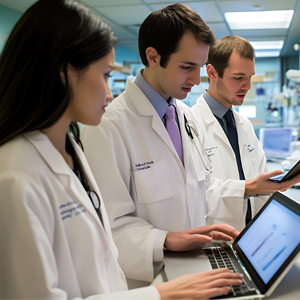Educating Medical Students On Healthcare Security And Data Protection
 The healthcare industry has become a frequent target of severe cyber attacks over the past years. According to the latest data, India's healthcare sector faces more than 6,900 cyber attacks per week, compared to an average of 1,821 attacks per healthcare organisation globally. Because of the significant increase in ransomware and phishing attacks, hospitals and clinics are forced to redirect patients and postpone critical treatments and procedures, potentially endangering lives and general well being.
The healthcare industry has become a frequent target of severe cyber attacks over the past years. According to the latest data, India's healthcare sector faces more than 6,900 cyber attacks per week, compared to an average of 1,821 attacks per healthcare organisation globally. Because of the significant increase in ransomware and phishing attacks, hospitals and clinics are forced to redirect patients and postpone critical treatments and procedures, potentially endangering lives and general well being.
Since data harvested from healthcare systems contain sensitive information which could be used for malicious purposes or financial gain, cybersecurity and data protection training should be a priority in all medical institutions and schools. Teaching students to detect and report potential cyber threats can empower future physicians, nurses, med techs, and therapists. Knowing how to efficiently deal with cyber attacks can also help to protect patient information and maintain continued operations in medical facilities. Here's a guide to educate medical students on healthcare security and data protection.
Conduct Cybersecurity Training
Cybersecurity and healthcare data protection are topics that are not commonly taught in pre-med classes since they weren't a cause for concern until recently. To adapt to the times, colleges and universities should consider including tech-related topics in pre-med subjects. Lectures on digital disease management, telemedicine, and electronic medical records security, among others, can equip students with the basic skills to keep healthcare data safe.
Another option is to conduct yearly healthcare cybersecurity training or workshops. Hackers always find new ways to breach systems, but continuous learning can help to enhance knowledge and mitigate cyber attacks. It also creates a culture of cybersecurity in campuses, which can have a positive effect in the medical industry in the future. Some of the topics that should be covered in training sessions include phishing awareness, wherein students will be taught to recognize phishing attempts via email scams. Ransomware and malware awareness should also be discussed, as well as security policy and incident reporting procedures.
To make cybersecurity training more enjoyable for students, make it an interactive experience through gamification. Incorporate quizzes and games such as cyber security trivia or a scavenger hunt to boost participation and make the experience more fun for everyone. Consider creating hands-on cyber security activities to enhance understanding and see how students respond to cyber threats. At the end of the training or workshop, award prizes or badges to winners, and don't forget to give certificates to all the participants.
Encourage Students to Use Strong Passwords
Encourage medical students to take an active role in protecting sensitive data by teaching them basic cybersecurity practices, such as using strong and unique passwords for each website or service. Weak or default passwords are the biggest threat to healthcare cybersecurity since it can lead to unauthorized access, data loss, data breaches, and system takeover. According to recent data, about 75 percent of people globally don't adhere to recommended password practices, while more than 60 percent either use weak passwords or the same password for multiple accounts.
Using weak passwords can result in financial damage and loss of reputation, so creating strong passwords and managing them effectively should be the standard in all organizations and learning institutions. If students are using online learning systems or apps to access lectures, reading material, or to upload papers, universities should define clear guidelines for password creation, including the required character types and minimum length. Updating passwords on a regular basis can also help to lower the risks of being hacked.
Practice Safe Internet Habits While On and Off Campus
Practicing safe online habits is a must, whether you're on or off campus. Since cyber criminals can hack into networks, remind medical students to only use secure Wi-Fi networks to access sites with sensitive data. What's more, hackers are known to set up Wi-Fi networks that mimic legitimate public or school networks, and by connecting to these fake networks, cyber criminals will be able to steal information, log-in credentials, and other data.
To avoid joining random Wi-Fi networks, students should disable their automatic network connections on their phones or laptops. Also, if they'll be using their devices in public spaces such as cafes or restaurants to access school websites, students should make it a point to use a VPN to encrypt their data and hide their IP address.
It's never to early to learn Internet safety practices, especially if one plans on having a career in the healthcare sector. Consider the tips above to educate medical students on healthcare security and data protection to nurture a cybersecurity culture on campus, and improve security practices in hospitals and health institutions in the future.

